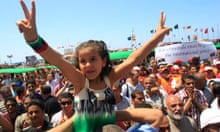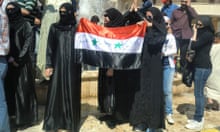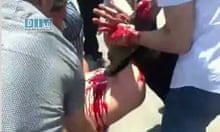Prospects for a negotiated solution to the Libyan crisis receded further on Monday after the international criminal court (ICC) issued arrest warrants for Muammar Gaddafi and his son Saif al-Islam over crimes against humanity allegedly committed during anti-regime protests.
The court, which is based in The Hague, also issued a warrant for the Libyan intelligence chief, Abdullah al-Senussi, at the request of the ICC's chief prosecutor.
Libyan sources said Belarus, which is not a signatory to the ICC treaty, may be an exile location for Gaddafi, though Gaddafi himself has insisted he will not leave Libya. In power since 1969, he is only the world's second serving head of state to be issued with an ICC arrest warrant.
A warrant was issued in March 2009 for the arrest of Sudan's president, Omar al-Bashir, over alleged crimes in Darfur.
Arrests were necessary to prevent a cover-up and more crimes, said the ICC's presiding judge, Sanji Mmasenono Monageng. Amnesty International and Human Rights Watch both welcomed the move.
The Libyan government last night dismissed the arrest warrants, saying they were based on "falsified charges".
Mohammed al-Qamoodi, the Libyan justice minister, said: "This case is nothing but a cover for the military operations of Nato." Nato had declared its intention to assassinate Gaddafi, he added.
"The actions of Nato are crimes against humanity, crimes that the ICC should deal with. The Libyan state will prosecute Nato for crimes committed in Libya." Qamoodi said Libya is not party to the ICC and therefore does not recognise its jurisdiction.Khaled Kaim, the Libyan deputy foreign minister, described the ICC as "the equivalent of the US tribunal at Guantanamo Bay", adding that it represented "an attempt by Europe for the re-colonisation of Africa."
In Tripoli, an opposition supporter said the regime would try to keep Gaddafi out of sight: "The Libyan government will keep trying to hide him away and transfer him from one place to another."
The investigation by the court's chief prosecutor, Luis Moreno-Ocampo, followed a referral in February by the UN security council. Resolution 1970 was supported by all members of the council, including Russia and China, who are unhappy with the Nato bombing.
The ICC has been attacked by some for pursuing legal redress at the expense of a possible political solution.
Critics argue that Gaddafi and his closest associates will have no incentive to relinquish power or go into voluntary exile if they know they are certain to end up in the dock.
In Britain, which is playing a leading role in the Nato operation, some officials have said privately that the ICC case may be left "on the back burner" in the hope this would encourage Gaddafi to flee.
But William Hague, the foreign secretary, hailed the ICC decision, saying: "The warrants further demonstrate why Gaddafi has lost all legitimacy and why he should go immediately. His forces continue to attack Libyans without mercy and this must stop." Nato's secretary-general, Anders Fogh Rasmussen, echoed this.
Rumours that Gaddafi's wife and daughter were already in Belarus could not be confirmed. But the Libyan leader has rejected any suggestion that he will stand down or go abroad.
Saif al-Islam Gaddafi, who is well connected in the UK and had been seen as a possible interlocutor with the west, has also vowed to "live or die" in Libya.
In the rebel-held city of Benghazi opponents of the regime have strongly supported the ICC case and promised to hand over any suspects in their custody.
"The prosecutor presented clear and compelling evidence against all three," said Philippe Sands, professor of international law at University College London. "The real question is: does this speed up resolution of the conflict? That's difficult to assess. It rules out a possible initiative to achieve a political solution – because if any of these three arrived in a country that is a state party to the ICC they would be immediately arrested.
"But it does up the ante and increases the pressure. They will certainly have to think harder about where they will go if the regime collapses."
Monageng told the court there were "reasonable grounds to believe" the regime killed or injured and arrested hundreds of civilians, and Gaddafi exercised full control over the security forces.
In his submission Moreno-Ocampo said Gaddafi had a personal hand in planning and implementing "a policy of widespread and systematic attacks against civilians and demonstrators and dissidents".


